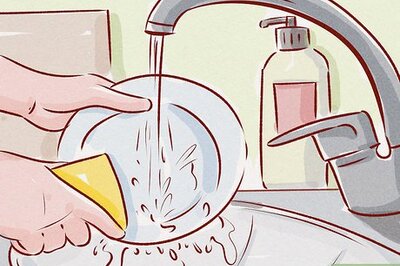
views
Amman: Syrian tanks stormed a city in the east of the country on Sunday, crushing makeshift barricades, opening fire and seizing the central square, residents said; in a fresh crackdown that activists said killed dozens of civilians.
The assault on the provincial capital Deir al-Zor comes a week after tanks stormed the city of Hama, where activists say scores have been killed in an ongoing siege to crush five-months of protests against President Bashar al-Assad's rule.
"Early this morning columns of army tanks and bulldozers, under cover of heavy rounds of gunfire, stormed into the western and northern entrances of the city and dismantled barricades set up by residents," a Deir al-Zor resident said.
"A dozen tanks are taking position in the main square in Jubaila market in the northern sector of Deir al-Zor," the resident, who gave his name as Abu Bakr, said by telephone.
The government denied the Deir al-Zor assault had taken place. The official state news agency said "not a single tank has entered Deir al-Zor" and reports of tanks in the city were "the work of provocateur satellite channels". Syria has barred most journalists, making it hard to confirm events.
The Syrian Revolution Coordinating Committee said 50 people had been killed in Deir al-Zor on Sunday and at least 13 had been killed in a separate, tank-led assault on villages in the central Houla Plain, near the city of Homs.
"The numbers of casualties are escalating by the hour," activist Suhair al-Atassi, a member of the Coordinating Union, said by phone from Damascus.
Syrian authorities say they are fighting armed saboteurs who have provoked violence by attacking the security forces. Rights groups and Western states say Assad's forces have repeatedly fired on peaceful demonstrators to crush an uprising.
Activists say government troops have killed at least 1,600 civilians in five months of an increasingly violent crackdown. The government says gunmen have killed more than 500 members of the security forces.
The Arab League, in a rare response to the escalating bloodshed, joined the international wave of criticism on Sunday, calling on authorities to stop acts of violence against protesters, the Qatar News Agency reported.
Assad defended the army's campaign.
"Dealing with outlaws and convicts who stage highway robbery and seal off cities and terrorise the population is a national duty," state news agency SANA quoted him as telling Lebanese Foreign Minister Adnan Mansour.
Robert Ford, US ambassador to Syria, said in an interview with "ABC This Week" that the assault on Hama was an "atrocity" but that residents told him they did not want outside military intervention when he visited the city last month.
An Assad adviser said neighbouring Turkey, which condemned the attack on Hama as an atrocity, should not meddle in Syrian affairs, and warned Foreign Minister Ahmet Davutoglu he would get a frosty reception when he visits Damascus on Tuesday.
Cairo-based activist Ammar Qurabi said 42 people were killed in Deir al-Zor and 17 in Houla. Another 28 were killed overnight, he said, including eight in the northern province of Idlib after protests at evening prayers.
The military assault on Deir al-Zor, about 400 km (250 miles) north-east of Damascus, was launched a day after UN Secretary General Ban Ki-moon told Assad he was alarmed by the escalating violence and demanded he rein in the army.
Ban "urged the president to stop the use of military force against civilians immediately," the UN's media office said.
Residents of Deir al-Zor, situated on the Euphrates river in a province bordering Iraq's Sunni heartland, had been bracing for an assault on their city. An Internet video last week showed a tribal meeting discussing preparations for armed resistance to any military attack.
In the past, authorities allowed local tribes to arm as a counterweight to a Kurdish population further northeast.
But ties between Assad's minority Alawite rule and the Sunni Muslim province deteriorated after years of water shortages decimated agriculture and led to the internal displacement of up to a million people.
Together with Hama, Deir al-Zor became the centre of the largest demonstrations against Assad family rule.
Deir al-Zor resident Abu Bakr, from the Jubaila area which has seen some of the largest anti-Assad demonstrations in recent weeks, said mosque loudspeakers were blaring "Allahu Akbar" (God is greatest) on Sunday.
Another resident said tanks and armoured personnel carriers had deployed in the centre of town.
"Shells are now hitting al-Joura district," he said, the sound of machinegun and tank fire echoing in the background. "No one dares go out in the street near the main square."
Turkish Prime Minister Tayyip Erdogan, who forged close ties with Assad but has been sharply critical of the crackdown, said his foreign minister, Davutoglu, would visit Damascus on Tuesday. "Our message will be decisively delivered," he said.
Assad's adviser Bouthaina Shaaban criticised Ankara for failing to condemn "the savage murders of civilians and military men by armed terrorist groups".
"If...Davutoglu is coming to Syria to deliver a decisive message, then he will hear even more decisive words in relation to Turkey's position," Shaaban said.
An official source also criticised a statement by Gulf Arab states who broke months of silence on Saturday to express concern about over the violence in Syria. The source, quoted by SANA, said the six-nation Gulf Cooperation Council had ignored the "killing and sabotage carried out by armed groups".
State television broadcast footage of weapons it said were seized at the border with Lebanon. SANA also quoted an official source saying 13 mutilated bodies of members of the security forces were found in the Orontes River near Hama on Saturday and that two soldiers were killed near Homs.
In Hama, troops stormed houses and arrested dozens of people as tanks and armoured vehicles deployed throughout the city, residents said, after a week-long assault which activists say killed at least 130 people. One group put the toll at more than 300 civilians.
Assad's father, Hafez al-Assad, crushed an armed Islamist uprising in Hama nearly 30 years ago, killing many thousands of people and razing parts of the city's old quarter to the ground.
















Comments
0 comment